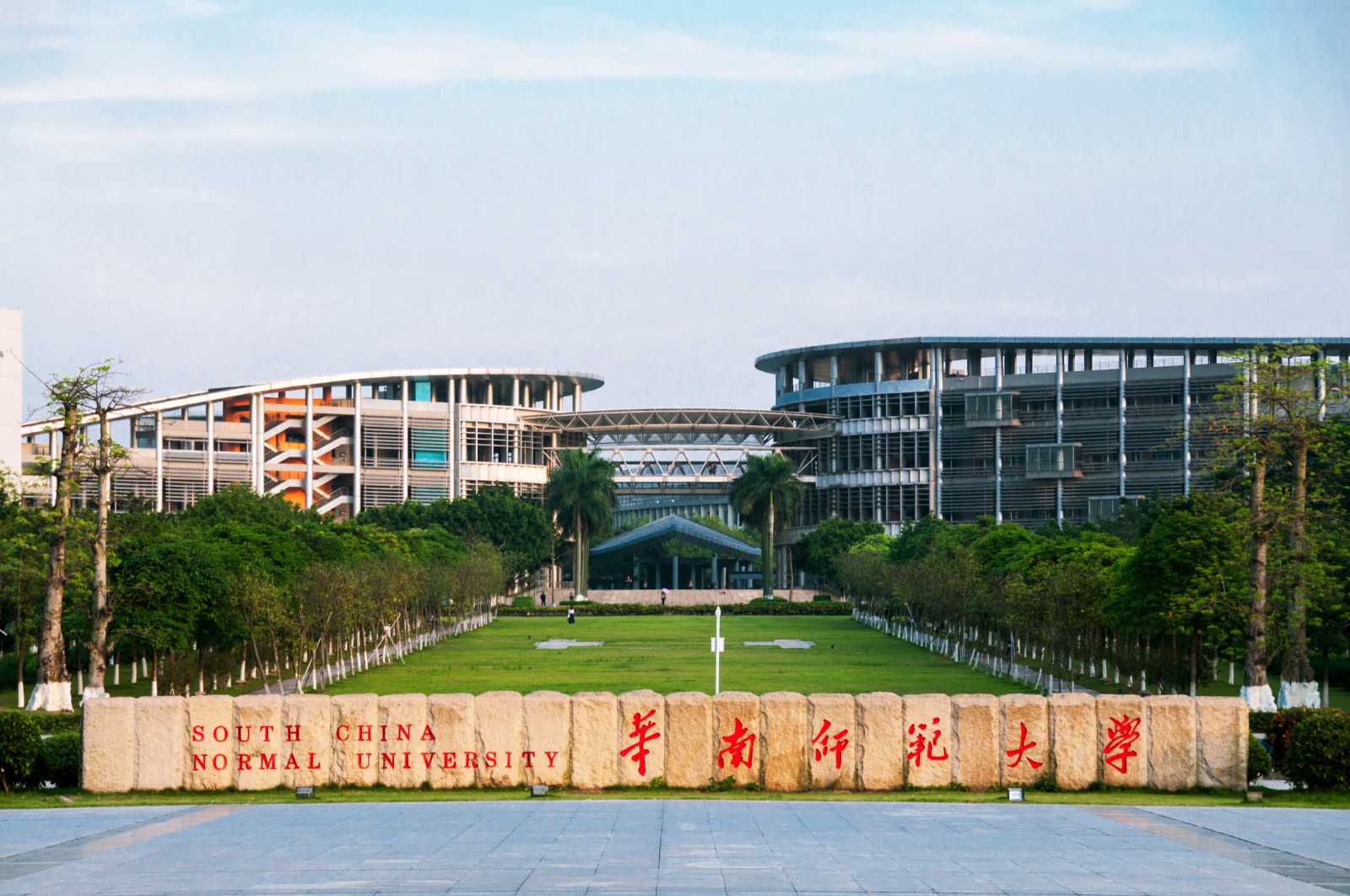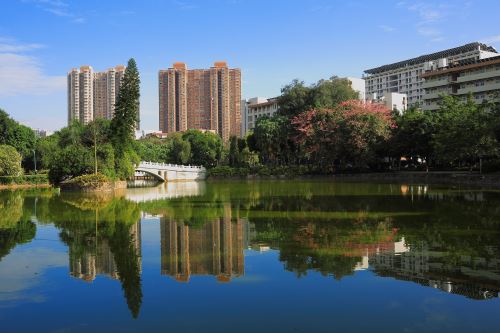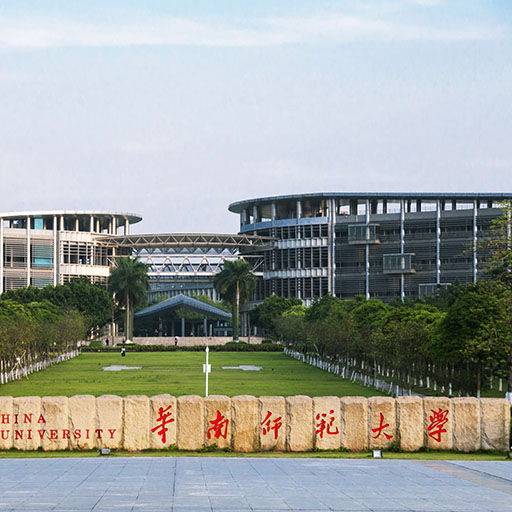South China Normal University (SCNU) is a Double World Class and Project 211 university as designated by China's Ministry of Education. It is also a key comprehensive university jointly subsidized by the province of Guangdong and the Ministry of Education, and listed as a provincial high-level university. SCNU now has four campuses in three cities: the Shipai campus and the University Town campus in Guangzhou, the Nanhai campus in Foshan, and the Binhai campus in Shanwei, three cities in Guangdong province, covering a total area of over 355 hectares. The university has four faculties, 35 schools and 9 research institutes and centers.

Founded in 1933, SCNU was originally known as Guangdong Provincial Xiangqin Normal College, and its history can be traced back to 1888 with the establishment of the Gezhi Academy. Distinguished educators including Lin Liru, He Jie, Du Guoxiang, Chen Weishi, Wang Yanshi and Ma Xiaoyun have previously served as college presidents. A number of famous people who have made tremendous contributions and are of significance the history of China were educated here, among others Wu Sanli, Gao Juefu, Wang Heqing, Sheng Xugong, Wang Yue, Ruan Jingqing, Huang Youmou, Guo Dali, Xiong Daren, Luo Zhaohan, Jao Tsung-I, Pan Jionghua, Luo Jun, Ye Shuwu, Ye Peihua, Wang Deliang, Li Jingchi, Li Kuangwu, Kang Baiqing, Zhu Bo, Liu Songhao, and Sun Ruyong. Over the past nine decades, SCNU has been adhering to the philosophy of "advancing the frontiers of knowledge and cultivating expertise for the society", and continuing the essence of the motto "fostering the spirit of working hard; pursuing studies with utmost rigor; seeking truth from facts with innovation; and being a model of virtue for others". The university has trained more than 900,000 teachers and talents in other industries.

SCNU has now developed into a comprehensive teacher training university with the distinctive characteristics of teacher education and a full range of academic disciplines. While implementing the development strategy of "highlighting distinctive characteristics in teacher education and advancing the levels of all disciplines", SCNU promotes the three initiatives of "striving for double world class excellence, improving weak links and pursuing systematic development of teacher education". It also focuses on internal cultivation and external introduction of high-level young talents, works to build high-end platforms, and devotes itself to ongoing internationalization while staying at the forefront of in the application of IT.

Following the path of socialist education with Chinese characteristics, SCNU fully implements the Party's educational policies and uses Xi Jinping Thought on Socialism with Chinese Characteristics for a New Era to educate people. SCNU has built a talent development system that stresses all-round development in morality, intelligence, physical education, beauty and labor, and created its unique ideological and political work system through Party building. In 2016, SCNU teacher reported to General Secretary Xi Jinping at the national ideological and political work conference as one of the university representatives. In 2019, SCNU was on the shortlist for a Party-building demonstration university recommended by the Ministry of Education; it passed the inspection in 2022.

The discipline of Physics entered the national project of "World-class Disciplines Development"; the School of Marxism was selected as a National Key School of Marxism. Four disciplines, namely Psychology, Marxist theory, Physical Education and Education, ranked among the top 10% Chinese disciplines in the discipline evaluation organized by the Ministry of Education. 13 disciplines rank among the global top 1% in the World ESI, viz. Chemistry, Materials Science, Physics, Engineering, Environment/Ecology, Plant & Animal Science, Psychiatry/Psychology, Mathematics, Neuroscience & Behavior, Clinical Medicine, Social Sciences General, Computer Science, and Agricultural Science. Among them, seven disciplines, namely, Chemistry, Materials Science, Engineering, Plant & Animal Science, Environment/Ecology, Social Sciences General, and Psychiatry/Psychology ranked top 5‰ worldwide.

SCNU consists of 53 schools and academic units, with its professional disciplines covering 12 subject categories. South China Normal University offers 97 undergraduate programs, 32 first-level disciplines authorized to confer master's degrees, 26 master's programs for professionals, and 20 first-level disciplines to confer doctorates, one doctoral program for professionals. There are currently over 30,000 full-time undergraduates, 13,000 master students, and 1,500 PhD students.
The university was approved for 45 national-level first-class undergraduate major construction sites and 19 provincial-level first-class undergraduate major construction sites. 57 undergraduate courses were recognized as national first-class level and 185 named provincial first class. The disciplines of Physics and Psychology were selected as the base of the Top Student Training Program 2.0 for Basic Disciplines initiated by the Ministry of Education, with Physics also included on the Young Talent Training Program of Science and Technology for high school students.

There are about 5,500 faculty and staff, of which 2,600 are full time teachers, 1,400 hold professor or associate professor titles. 194 faculty members are recognized as national-level talents, 261 as provincial-level talents. There are six academicians, including the dual-employed and the foreign-employed, 49 recipients of the National "Four Youth Talents" award and 14 of the National Science Fund for Distinguished Young Scholars. 17 experts are supported by major talent programs initiated by the Ministry of Education, 15 named Leading Talents of "National High-level Talents Special Support Program", six enlisted in the Recruitment Program of Global Experts, and 29 participants of the Program for New Century Excellent Talents of the Ministry of Education. South China Normal University also boasts two "National University-level Teacher Teams in the Style of Huang Danian", three National Teaching Teams and five National Famous Teacher Awards.

There are 29 scholars awarded the Distinguished Young Scholars Fund of Guangdong province, 45 enlisted in major talent programs at the provincial level, 21 hired through the provincial Recruitment Program of Global Experts, 54 supported by the Special Support Plan for High-level Talents of Guangdong. Additionally, there are three recipients of the National May 1 Labor Medal, five of the May 1 Labor Medal and three awarded the title of "Model Worker", both awards of Guangdong province.
SCNU boasts two national research platforms, namely, the National Center for International Research on Green Optoelectronics and the Engineering Research Center for the High Power Safe Lithium-ion Battery Electrolyte and the Manufacturing of the Diaphragm Materials. There are 66 science and technology research platforms (i.e. Key Laboratories and Engineering Research Centers under the Ministry of Education) and 56 research platforms for humanities and social sciences (i.e. the Center for Applied Psychological Research and the Research Center for Xi Jinping Thought on Socialism with Chinese Characteristics for the New Era under the Ministry of Education).

SCNU, as the principal investigator's institution, was honored with two second prizes of the State Natural Science Award, one second prize of the State Technological Invention Award, three first prizes of the Natural Science Award of the Ministry of Education and one first prize of the Technological Invention Award of the Ministry of Education. The university also three times received the first prize of the Outstanding Achievement Award of Scientific Research in Institutions of Higher Learning (Humanities and Social Sciences). Several important discoveries were made at SCNU, such as the inscriptions on the bones and tortoise shells of the Shang Dynasty (about 1600 BCE - 1046 BCE), cultural relics unearthed from the Warring States period (476 BCE – 221 BCE), and inscriptions on bronzewares of the Shang and Zhou Dynasty (1600 BCE – 256 BCE).
SCNU has built joint research institutes with the local governments in the cities of Qingyuan, Zhaoqing, Panyu and Meizhou. It also has three institutions classified as new provincial R&D institutions of the Guangdong province, and 39 industry-university-research bases in collaboration with domestic enterprises.

SCNU features prominent teacher education, which covers general education, special education, and vocational education and involves preschool, primary, and secondary education. Teacher training programs are also offered at the undergraduate, master's and doctoral degree levels. As the "working machine" of basic education, South China Normal University is committed to promoting the quality of teaching staff and developing a high-end education think tank in southern China, thus contributing to the comprehensive education reform in the Guangdong province. A number of affiliated kindergartens, primary schools and high schools have been set up in collaboration with the university, which play an important role in basic education in China. SCNU won 15 National Teaching Achievement Awards and seven basic education achievements, ranking first among teacher training colleges and universities in the country.
With a commitment to the opening up of education, SCNU has formed the philosophy of "integrating into the Bay Area, deepening engagement with Southeast Asia, cooperating with the BRIC countries, going global" in international cooperation. The university has established partnerships with over 100 higher education institutions worldwide in fields like talent training, faculty exchanges and scientific research, and enrolled international students from over 110 countries and regions.

South China Normal University has joined international cooperation groups like LHCb, BESIII, STAR and CMS, established international joint laboratories with six universities in the Netherlands, Italy, Belgium and other countries, and jointly built the Guangdong-Hong Kong Joint Laboratory of Quantum Matter with the University of Hong Kong and the Hong Kong University of Science and Technology. Three institutes were approved as Centers for International and Area Studies by the Ministry of Education, which include the Center for Southeast Asian Studies, the East Timor Research Center, and the Hong Kong and Macao Research Center. The Comprehensive Research Base for Hong Kong, Macao and Taiwan Textbooks was included in the list of the national Research Institutes for Teaching Materials.
SCNU has also set up eight overseas research bases in seven countries in Southeast Asia, as well as postgraduate teaching centers in the Hong Kong Special Administrative Region, the Macao Special Administrative Region, and Malaysia. The Aberdeen Institute of Data Science and Artificial Intelligence, established by SCNU and the University of Aberdeen, marks the launch of the first Sino-foreign joint institute offering an undergraduate program in artificial intelligence in China.

SCNU has long maintained sound cooperation and interaction with the educational sector of the Hong Kong and Macao SARs. A training and exchange base for teachers from the Hong Kong SAR, the first such base on the mainland, was established at SCNU; over 70 percent of the total number of high school, primary school and kindergarten teachers in Macao were trained by SCNU. The Teacher Education College of Guangdong-Hong Kong-Macao Greater Bay Area of SCNU was established. Besides, South China Normal University has collaborated with the Education University of Hong Kong and the University of Macao to establish the Teachers' Federation in Guangdong-Hong Kong-Macao Greater Bay Area and the Guangdong-Hong Kong-Macao University Alliance for Teacher Education. Moreover, SCNU has established three Confucius Institutes in the city of Coquitlam in British Columbia, Canada, at the University of Reunion in France, and at the University of Latvia in the Republic of Latvia, two of which were awarded "Excellent Confucius Institute of the Year".
Embarking on a new journey in a new era, South China Normal University will continue to take strengthening education as its mission and upholding moral values and foster talents under the guidance of Xi Jinping Thought on Socialism with Chinese Characteristics for a New Era. Based on the national overall plans of strengthening education and the specific "1310" plan outlined by the provincial party committee, SCNU proposes its "1238" development vision: to focus on "One goal", implement a "Two-step" strategic plan, unleash the "Three major" driving forces of innovation, reform and opening-up to accelerate the building of "'Eight first-class' systems". SCNU strives to build a comprehensive, innovative world-class university with the distinctive characteristic of teacher education, cultivate more good teachers with the "four virtues" as well as talents in different sectors so as to make greater contributions to helping China develop into a leading country and realizing the great rejuvenation of the Chinese nation.

